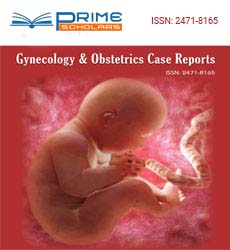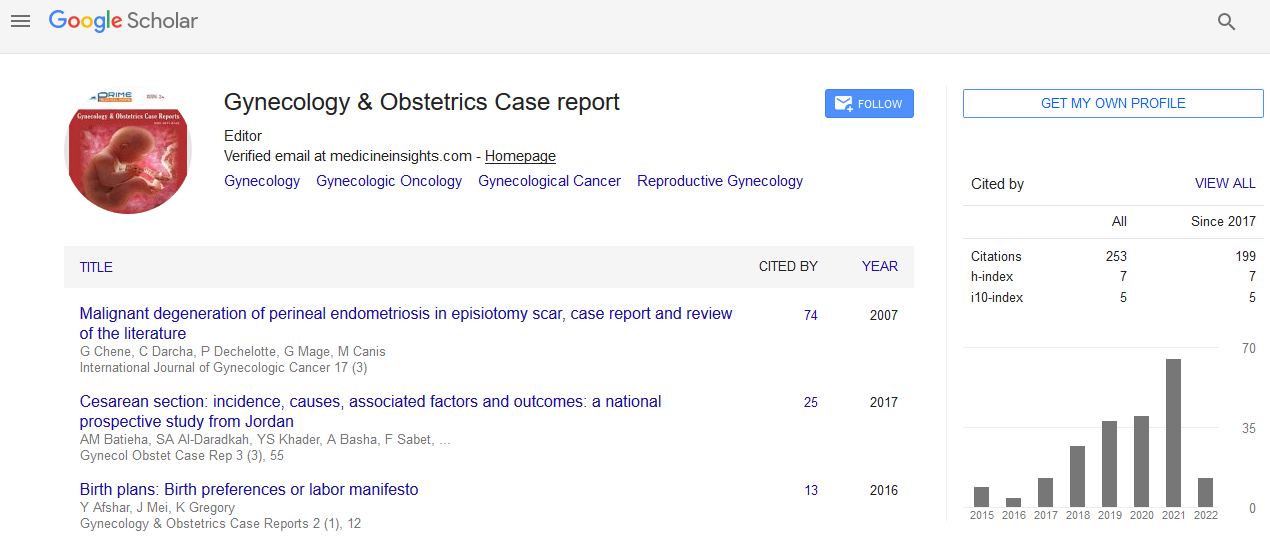Mini Review - (2023) Volume 9, Issue 1
The Importance of Postpartum Care: Understanding the Physical and Emotional Changes after Pregnancy
Sophie Alma*
Department of Obstetric Medicine, Guy’s and St Thomas’ Hospitals, NHS Foundation Trust, London, UK
*Correspondence:
Sophie Alma, Department of Obstetric Medicine, Guy’s and St Thomas’ Hospitals, NHS Foundation Trust, London,
UK,
Email:
Received: 21-Dec-2022, Manuscript No. IPGOCR-23-15833;
Editor assigned: 23-Dec-2022, Pre QC No. IPGOCR-23-15833 (PQ);
Reviewed: 05-Jan-2023, QC No. IPGOCR-23-15833 (Q);
Revised: 10-Jan-2023, Manuscript No. IPGOCR-23-15833 (R);
Published:
17-Jan-2023, DOI: 10.36648/2471-8165.9.1.1
Abstract
Pre-pregnancy is a period of time before a woman conceives a child. It is a critical time when a woman can make
healthy lifestyle choices that can have a positive impact on her pregnancy and the health of her baby. In this
article, we will discuss some important aspects of pre-pregnancy care that every woman should be aware of.
Pregnancy is a significant event in a woman's life, and so is the postpartum period. The postpartum period is the
time after childbirth, which lasts for about six weeks. During this period, women experience numerous physical
and emotional changes, some of which can be challenging to cope with. In this article, we will discuss what
happens after pregnancy, the physical and emotional changes that women experience, and how to take care of
you during the postpartum period.
Keywords
Pre-pregnancy; Post-pregnancy; Healthy pregnant women
Introduction
Pre-pregnancy is a crucial period for a woman, where she
can make healthy lifestyle choices that can positively impact
her pregnancy and the health of her baby. A woman should
aim to consume a well-balanced diet rich in essential nutrients,
including folic acid, calcium, and iron. Regular exercise can
improve overall health and reduce the risk of pregnancy-related
complications. Smoking, alcohol, and drugs can negatively
impact a woman's health and the health of her baby, and
should be avoided before trying to conceive. A preconception
checkup is recommended, where a healthcare provider will
review the woman's medical history, perform a physical exam,
and recommend any necessary tests or vaccinations. Certain
medications can harm a developing fetus, and a woman should
review her medication list with her healthcare provider before
trying to conceive.
The postpartum period is the time after childbirth, lasting
for about six weeks. Women experience physical and emotional
changes during this period, which can be challenging to cope
with. Physical changes include postpartum bleeding, breast
engorgement, and vaginal soreness. Emotional changes include
postpartum depression, anxiety, and mood swings [1]. It is
essential to take care of yourself during the postpartum period,
including getting enough rest, eating a well-balanced diet,
and staying hydrated. Seeking support from family, friends,
or a healthcare provider can also be beneficial. Breastfeeding
is encouraged during the postpartum period, as it provides
numerous benefits for both the mother and the baby. It is
crucial to attend postpartum checkups to ensure that any
issues are identified and treated promptly.
Literature Review
Healthy eating habits
Healthy eating habits are essential for a woman who is
planning to conceive. A well-balanced diet rich in essential
nutrients such as folic acid, iron, and calcium is essential for
a healthy pregnancy. Folic acid, in particular, is crucial for the
development of the baby's neural tube, which forms the baby's
brain and spinal cord. A deficiency in folic acid can lead to
neural tube defects, which can cause serious birth defects. A woman should consume at least 400 micrograms of folic acid
daily, either through a supplement or a diet rich in folic acid.
In addition to folic acid, a woman should consume a diet
rich in fruits, vegetables, lean proteins, and whole grains. She
should limit her intake of processed foods, sugary drinks, and
foods high in saturated and trans fat. A healthy diet can help a
woman maintain a healthy weight, reduce the risk of gestational
diabetes and other pregnancy-related complications, and
promote a healthy birth weight for her baby [2].
Exercise
Regular exercise can improve a woman's overall health and
reduce the risk of pregnancy-related complications. It can also
help a woman maintain a healthy weight, which is essential
for a healthy pregnancy. However, it is important to consult
a healthcare provider before starting any exercise program,
especially if a woman has a medical condition or has not
exercised before.
A woman should aim to exercise for at least 30 minutes a
day, five days a week. She should engage in moderate-intensity
activities such as brisk walking, swimming, or cycling. She
should also include strength training exercises such as lifting
weights or using resistance bands to build muscle and improve
her overall fitness [3].
Smoking, alcohol and drugs
Smoking, alcohol, and drugs can have a negative impact on
a woman's health and the health of her baby. Smoking during
pregnancy can increase the risk of preterm labor, low birth
weight, and respiratory problems in the baby. Alcohol can cause
fetal alcohol syndrome, which can lead to facial abnormalities,
growth problems, and intellectual disabilities. Drugs, both legal
and illegal, can also harm the baby's development and lead to
birth defects, premature birth, and low birth weight.
A woman should quit smoking, drinking alcohol, and using
drugs before trying to conceive. If she needs help quitting, she
should talk to her healthcare provider or seek support from a
smoking cessation program, an alcohol treatment program, or
a drug rehabilitation program [4].
Preconception checkup
A preconception checkup is a medical exam that a woman
should undergo before trying to conceive. It can help identify
any potential health issues that could affect her pregnancy and
the health of her baby. During the checkup, the healthcare
provider will review the woman's medical history, perform
a physical exam, and recommend any necessary tests or
vaccinations.
The healthcare provider may recommend that a woman
undergo certain tests, such as a Pap test to screen for cervical
cancer, a blood test to screen for sexually transmitted
infections (STIs), and a genetic test to identify any inherited
conditions that could affect the baby's health. The healthcare
provider may also recommend that a woman receive certain
vaccinations, such as the flu vaccine or the Tdap vaccine, which
protects against tetanus, diphtheria, and pertussis.
Medications
Certain medications can harm a developing fetus and
should be avoided during pregnancy. A woman should review
her medication list with her healthcare provider before trying
to conceive to ensure that all medications
Physical changes
Vaginal Discharge: After delivery, women experience vaginal
discharge, also known as lochia. Lochia is a mixture of blood,
mucus, and uterine tissue, which is discharged from the vagina.
Lochia lasts for about six weeks and gradually decreases in flow.
Breast changes: During pregnancy, the breasts become
larger as they prepare for milk production. After delivery, the
breasts may become engorged and tender as the milk supply
comes in. This may cause discomfort and pain, but it is normal
and should subside within a few days. If the engorgement lasts
longer than a week, consult your healthcare provider.
Abdominal changes: After childbirth, the uterus begins
to shrink back to its pre-pregnancy size. This process is called
involution and may cause cramping and discomfort. The
abdominal muscles may also feel weak, and some women
may experience diastasis recti, which is a separation of the
abdominal muscles [5].
Weight loss: After childbirth, women usually lose about
10-13 pounds due to the delivery of the baby, placenta, and
amniotic fluid. However, it is normal to retain some weight
due to fluid retention and increased calorie intake during
breastfeeding.
Hormonal changes: During pregnancy, the body produces
high levels of hormones such as estrogen and progesterone,
which help to maintain the pregnancy. After delivery, the levels
of these hormones drop rapidly, which can cause mood swings,
irritability, and fatigue.
Emotional changes
Postpartum blues: Many women experience the baby
blues, a mild and temporary condition that occurs due to
hormonal changes after delivery. Symptoms include mood
swings, tearfulness, and irritability, and usually resolve within
a few days to two weeks.
Postpartum depression: Postpartum depression is a more
severe form of mood disorder that can occur within the first
year after delivery. Symptoms include extreme sadness, loss
of interest in activities, changes in appetite and sleep, and
difficulty bonding with the baby. If you experience any of these
symptoms, talk to your healthcare provider immediately.
Postpartum anxiety: Postpartum anxiety is a common
condition that can occur after childbirth. Symptoms include
excessive worry, racing thoughts, and difficulty sleeping. If you
experience any of these symptoms, talk to your healthcare
provider [6].
Post-Traumatic Stress Disorder (PTSD): Some women may
develop PTSD after a difficult delivery, such as an emergency
cesarean section or a traumatic birth experience. Symptoms
include flashbacks, anxiety, and nightmares.
Baby blues vs. Postpartum depression: It is essential
to differentiate between the baby blues and postpartum
depression. Baby blues usually resolve within two weeks, while
postpartum depression requires medical treatment.
Taking care of yourself
Rest: Rest is crucial during the postpartum period. Sleep
when the baby sleeps and limit visitors to ensure you get
enough rest.
Proper nutrition: A balanced diet is essential for postpartum
recovery. Make sure to eat nutritious foods and drink plenty of
water to stay hydrated.
Gentle exercise: Gentle exercise such as walking and pelvic
floor exercises can help strengthen your muscles and speed
up your recovery. However, avoid strenuous exercise until you
receive.
Conclusion
In conclusion, pre-pregnancy and post-pregnancy care is
critical periods for women. During pre-pregnancy, women can
make healthy lifestyle choices that can positively impact their
pregnancy and the health of their baby. Eating a well-balanced
diet, exercising regularly, avoiding smoking, alcohol, and drugs,
and reviewing medications with a healthcare provider are
all essential components of pre-pregnancy care. During the
postpartum period, women experience numerous physical and
emotional changes, which can be challenging to cope with.
Seeking support, attending postpartum checkups, and taking
care of oneself, including getting enough rest, eating a healthy
diet, and staying hydrated, can help women navigate the
postpartum period successfully. Breastfeeding is encouraged,
as it provides numerous benefits for both the mother and the
baby. It is crucial for women to prioritize their health and seek
support during both the pre and post-pregnancy periods to
ensure a healthy pregnancy, a healthy baby, and a successful
transition into motherhood.
Acknowledgements
Nil.
Conflict of Interest
The authors have no conflicts of interest to declare.
References
- Makani S, Kim W, Gaba AR (2004) Struma Ovarii with a focus of papillary thyroid cancer: A case report and review of the literature. Gynecol Oncol 94(3):835-839.
[Google Scholar], [Crossref], [Indexed at]
- Ueland FR (2017) A perspective on ovarian cancer biomarkers: Past, present and yet-to-come. Diagnostics 7(1):14.
[Google Scholar], [Crossref], [Indexed at]
- Hubbard HS (2001) Gynecologic examination of adolescents. Am J Nursing 101(3):24AAA.
[Google Scholar]
- Handa VL, Garrett E, Hendrix S, Gold E, Robbins J (2004) Progression and remission of pelvic organ prolapse: A longitudinal study of menopausal women. Am J Obstet Gynecol 190(1):27-32.
[Google Scholar], [Crossref], [Indexed at]
- Roohan PJ, Bickell NA, Baptiste MS, Therriault GD, Ferrara EP, et al. (1998) Hospital volume differences and five-year survival from breast cancer. Am J Pub Health 88(3):454-457.
[Google Scholar], [Crossref], [Indexed at]
- Achouri A, Huchon C, Bats AS, Bensaid C, Nos C, et al. (2013) Complications of lymphadenectomy for gynecologic cancer. Euro J Surg Oncol 39(1):81-86.
[Google Scholar], [Crossref], [Indexed at]
Citation: Alma S (2023) The Importance of Postpartum Care: Understanding the Physical and Emotional Changes after Pregnancy. Gynecol Obstet Case Rep. Vol.9 No.1:1.
Copyright: © Alma S. This is an open-access article distributed under the terms of the Creative Commons Attribution License, which permits unrestricted use, distribution, and reproduction in any medium, provided the original author and source are credited.

